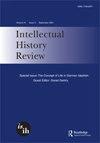The English Universal History’s treatment of the Arab world
Q1 Arts and Humanities
引用次数: 0
Abstract
ABSTRACT The Universal History, which had a complicated publishing history from the 1730s to the 1780s, was a commercial undertaking by a group of London booksellers, aimed at satisfying curiosity for reliable information about the rest of the world. It was finally composed of two separate parts, the Ancient and the Modern, which, while eventually published as a single work, were distinct. Its first author was George Sale, the noted translator of the Qur’an, who emphasized the recourse to original Arab manuscripts, although, after his death in 1736, later authors had a different approach. This article looks first at the work’s hostile view of Islam and claim that sympathy to it was a tactic of irreligious thinkers to undermine Christianity. It then analyses the somewhat confused discussion of the Arabs, which varies according to the sources used in the two parts, before highlighting the emphasis on Ottoman despotism. It finally evokes the call in the Modern Part for a European expedition to free North Africa from the Ottomans, destroy piracy in the Mediterranean, and encourage the North Africans to develop agriculture and trade. This call was copied in the best-selling French work, Raynal’s Histoire des Deux Indes.英国通史对阿拉伯世界的处理
从18世纪30年代到18世纪80年代,《世界通史》有着复杂的出版历史,它是一群伦敦书商的商业事业,旨在满足人们对世界其他地区可靠信息的好奇心。它最终由两个独立的部分组成,古代和现代,虽然最终作为一个单独的作品出版,但它们是不同的。它的第一位作者是著名的《古兰经》翻译家乔治·塞尔(George Sale),他强调要参考阿拉伯原始手稿,尽管在他1736年去世后,后来的作者们采用了不同的方法。这篇文章首先关注的是这部作品对伊斯兰教的敌意,并声称对它的同情是非宗教思想家破坏基督教的一种策略。然后,它分析了对阿拉伯人的一些混乱的讨论,根据两部分中使用的来源而有所不同,在强调奥斯曼专制之前。它最终唤起了近代欧洲远征的呼声,把北非从奥斯曼帝国的统治下解放出来,消灭地中海的海盗,鼓励北非发展农业和贸易。这一呼吁被复制到了法国最畅销的著作——雷纳尔的《双指数的历史》中。
本文章由计算机程序翻译,如有差异,请以英文原文为准。
求助全文
约1分钟内获得全文
求助全文

 求助内容:
求助内容: 应助结果提醒方式:
应助结果提醒方式:


